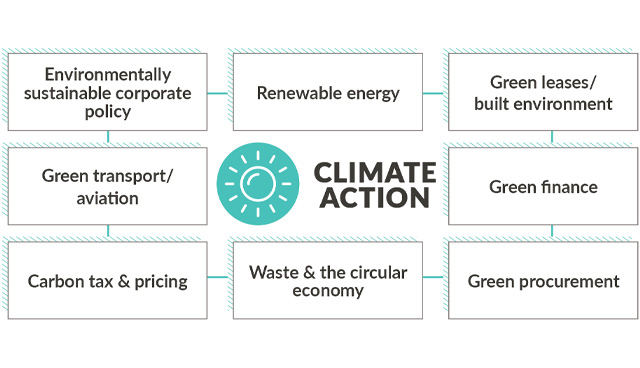Climate Action

The Government’s Climate Action Plan was published in July 2019. The plan outlines ambitious decarbonisation targets and how Ireland will seek to achieve those savings across the electricity, transport, industry, built environment and agricultural sectors. Below we look at where A&L Goodbody’s dedicated multi-disciplinarian climate action group is actively advising on.
Green Finance
All the evidence suggests that “climate friendly” industries will have easier access to capital than other industries in the future. The European Securities and Markets Authority has issued its Renewed Sustainable Finance Strategy and the Loan Market Association (LMA) also introduced its Green Loan Principles in late 2018 and its Sustainability Linked Loan Principles in early 2019. There was significant recent activity in the green bonds market in Ireland in 2019, with the NTMA and the ESB issuing green bonds and AIB introducing a green bond in its Euro Medium Term Note Issuance programme.
To achieve carbon neutrality, the EU will have to invest in (and finance) construction of green infrastructure, development of new green technologies, green energy systems and improvements to existing infrastructure. Conservative estimates put the required investment at €1 trillion.
Green Construction and Green Property
Developers and investors in commercial property are focusing on sustainability concerns at the initial construction phase as they wish to ensure that they future proof their buildings in order to achieve sustainability and preserve investment value. This is leading to sustainable products and construction techniques increasingly being used in projects.
In the residential property sector, buyers are becoming increasingly concerned about how green and efficient their homes are and the increasing demand for better BER ratings is a key example of this.
The sustainability requirements of the bigger corporate tenants in the market (particularly the tech companies) is driving the increased use of “green lease” covenants and green service charge regimes. These require that buildings are operated, managed and maintained on a sustainable basis. Large occupiers are pushing themselves to meet sustainability targets and therefore are demanding that their premises be built to and operated at high sustainability standards.
Offshore Renewable Energy
It is the Government’s ambition to see at least 3.5GW of offshore wind projects constructed by 2030. In January 2020, the Government published its Transitional Protocol for ‘Relevant Projects’ (largely capturing projects with an existing foreshore lease or a substantially advanced lease application).
Relevant Projects are considered to be the most advanced (including in terms of project design and environmental assessment) and therefore most likely first to be constructed. Under the Transitional Protocol it is proposed that Relevant Projects will be given a ‘Planning Interest’, a key ‘gating item’ under the new consenting regime, and therefore likely to be first in line to apply for the new form planning permission under that regime.
All the indications are that the commitment to delivering at least 3.5 GW of offshore wind by 2030, is being take seriously with:
- the approval by Government of the Heads of Bill for the Marine Planning and Development Management (MPDM) legislation in January 2020;
- the publication by the CRU of its offshore grid connection policy in February 2020; and
- a revised Marine Consenting System, with sufficient political impetus, being deliverable in 2020
Alan Roberts, aroberts@algoodbody.com
Alison Fanagan, afanagan@algoodbody.com
John Dallas, jdallas@algoodbody.com
Mark Stockdale, mstockdale@algoodbody.com
Mark Thompson, mthompson@algoodbody.com
Ross Moore, rmoore@algoodbody.com
![]()





